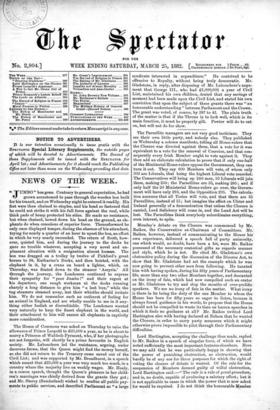Lord Hartington, accepting the challenge thus made, replied to Mr.
Raikes in a speech of singular force, of which we have noted sufficiently the most important features elsewhere. Here we may add that he was particularly happy in showing that the power of punishing obstruction, as obstruction, would hardly be of any use for those purposes for which the right of voting the closure of debate is wanted. Of the rule for the suspension of Members deemed guilty of wilful obstruction, Lord Hartington said :—" The rule is a rule of penal procedure, and is, no doubt, capable of producing a salutary effect ; but it is not applicable to cases in which the power that is now asked for would be required. I do not think the honourable Member
for Birkenhead ought to be punished by suspension, because he chooses to discuss on all occasions the subject of the French Treaty. I do not wish his constituents to be deprived of his services on that ground. At the same time, I do not want to be bound hand and foot to listen to his disquisitions on the French Treaty. Again, the honourable Member for Eye often thinks that there is no question so important to bring before the consideration of the House as the position of Russia in Central Asia. But I do not wish to see the honourable Member for Eye suspended, but only that the House should have some power of saying when the position of Russia in Central Asia is to be deemed satisfactory
The honourable Member for Bridport interrupted me just now Be may have an opportunity some day of calling the attention of the House to the subject of patent medicines. And I do not wish to invoke the authority of the Chair to suspend him, if he trespasses too long on that question ; but still, I think there are matters to the discussion of which a whole night might more profitably be devoted. And as for the honourable Mem- ber for Dungarvan, whose researches and knowledge extend equally to all questions, I think the House might sometimes enable a debate to be brought to a conclusion without the ad- vantage of a speech from the honourable Member. But I should like to accomplish that object without the honourable Member being named from the Chair, and I think that under this rule, it might sometimes be possible to do so." It would be hard to put the case with more force and humour. The satirical style suits Lord Hartington well. He has all the reticence and terse- ness which best set it off.



































